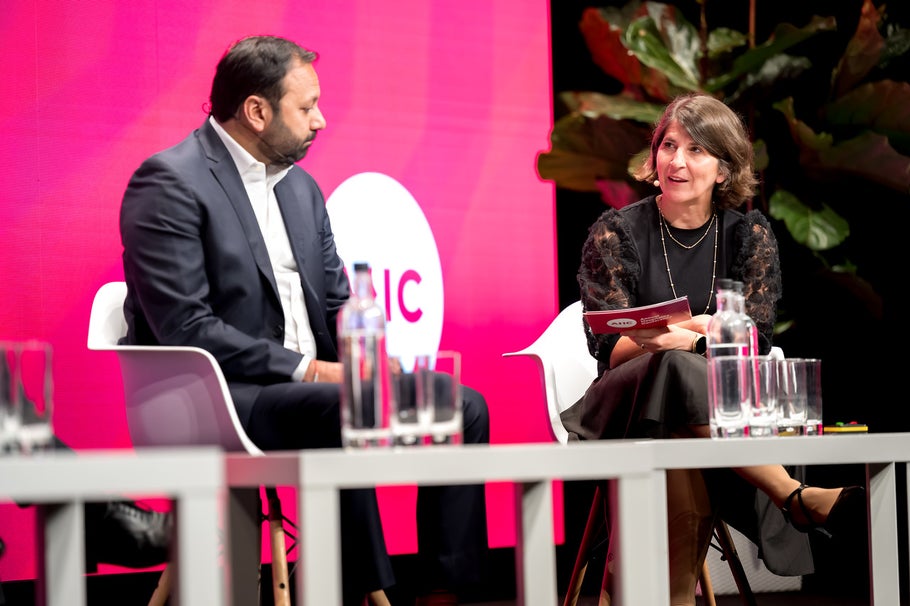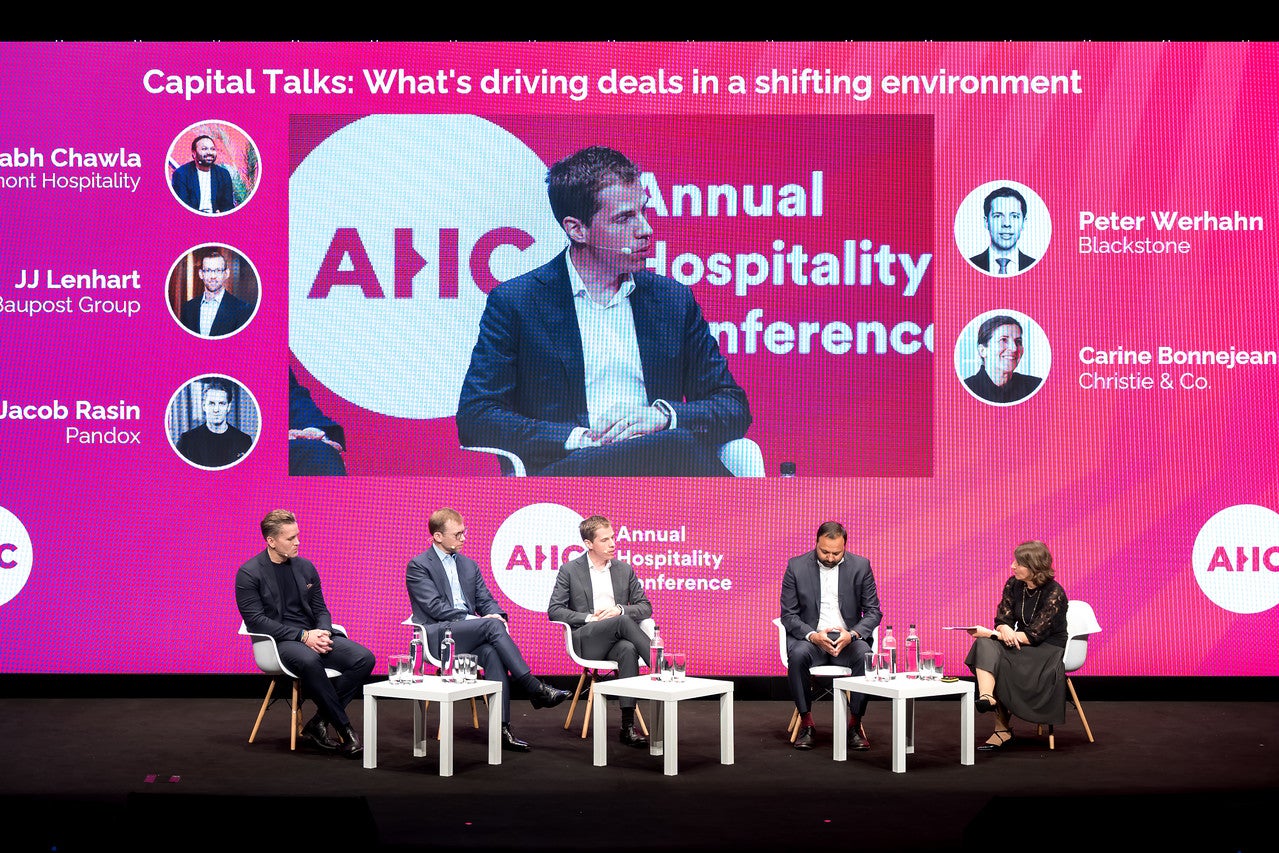Annual Hospitality Conference 2025: A pulse check on the UK hotel transaction market
We recently exhibited at the Annual Hospitality Conference in Manchester, where our Managing Director – Hotels, Carine Bonnejean, presented an update on what the data can tell us about the UK transaction market and the main factors driving deals. Here are the key takeaways.
Business. Built around You.
Your expert business property advisers

Carine Bonnejean
Managing Director – Hotels & International

Photography credit: Simon Callaghan Photography.
What is the market landscape for hotel transactions?
When we look at the broader UK commercial real estate picture, geopolitical and macroeconomic uncertainty has resulted in a much slower start to 2025 for real estate markets, following a busy end to 2024.
The extreme volatility of financial markets following President Trump’s tariffs turmoil in April slowed the market in Q2, particularly for US investors. Despite a marked slowdown, the UK was the largest and most liquid market in H1 across all sectors, despite still being down compared to 2024 due to macroeconomic uncertainty and a sticky inflation.
Looking at hotels, we have seen a significant year-on-year decline in transaction volumes, which were down nearly 75% in H1 2025 compared to H1 2024. This is one of the steepest drops across asset classes when compared to senior housing, office, industrial, retail and apartments, second only to data centres. However, as always, there’s more to the story which we will explore.
Zooming out to the European market, hotel transaction volumes are down around 9% year-on-year. The UK in particular saw a sharp fall from representing around 39% of volume last year to just 11% this year.
Breaking it down even further, about £1.1bn worth of hotels transacted in H1 2025, versus £4.2bn at the same point last year. London has seen a dramatic slowdown: just £352 million transacted in H1 2025 versus £1.65 billion in H1 2024. Regional UK also dropped from £2.5 billion to £730 million.
What’s driving these figures?
So, why is this? The answer lies in the deal mix. In H1 2025, nearly 80% of UK hotel transactions were single asset deals. This is a clear shift from H1 2024, where portfolios dominated at 82%. The lack of large portfolio activity has pulled down overall volumes.
As such, we are also seeing a shift in who is buying. In H1 2025, domestic buyers made up nearly 60% of the market, up from 35% last year. Private capital and HNWIs are more active, while institutional investors remain strong, but slightly down. Cross-border interest, especially from the US, has softened significantly.
Where are the hotspots for transaction activity?
Despite the slowdown, some regions are seeing strong activity. Outside of London, Scotland has seen a lot of activity, particularly Edinburgh and Glasgow, as well as the South East. Assets in strong locations in key UK regional cities continue to attract capital, especially for single asset deals.
Notable recent transactions include The W Hotel in Edinburgh, purchased by Schroders for £100m, and the Nobu Shoreditch which was acquired by Limestone Capital. These deals demonstrate how quality assets are still commanding strong pricing. Similarly, we have recently seen the Novotel Hammersmith bought by Arora Group for £160m, and the Hoxton Southwark transacting for £150m to Yellow Tree.

What is the outlook ahead?
There is reason for optimism. At Christie & Co, we have seen a steady rise in deal activity, especially over the summer. July and August were particularly strong, with record numbers of exchanges proving that the market is still functioning, just differently.
Despite the performance challenges, continued headwinds, and the upcoming Budget on 26th November, we are seeing more quality stock becoming available, fuelled in part by assets reaching the end of their investment life cycles or break-up sales from large portfolios which transacted last year after a flip to franchise.
Liquidity is still there, though creative deal structures and realistic pricing based on current earnings remain key to getting transactions over the line.
We are expecting more portfolio activity in H2 and into 2026. Several large deals are in the pipeline (Pandox, Malmaison and Hotel du Vin, Vastint Portfolios), which should help rebalance the mix and lift overall volumes. We can cautiously expect a more active H2 than H1.
However, cost pressures and stagnant interest rates are impacting the market. Hotel insolvencies have ticked up, especially in the last few quarters. We are not seeing widespread distress, but it is definitely something to watch.
Another factor is the use of hotels for government contracts. Asylum contracts have taken a significant number of rooms out of the market, particularly in secondary cities, but also in prime markets like London, Birmingham, or Bristol, impacting both supply and transactional stock. This is a topic to watch over the weeks and months to come.
Yields have remained relatively flat. UK interest rates have been held at 4% as the Bank of England governor warned “we’re not out of the woods yet” in terms of rising inflation. Rates are now expected to fall to near 3.75% in around six months, so pressure on bottom lines and stabilising yields are likely to impact on pricing.
In summary, while headline volumes are down, the market is still active: just more granular, more domestic, and more focused on single assets. Players in the sector will all await the Budget with anticipation, with more tax rises on the horizon. While the numbers may suggest a quieter market, the reality is more complex, selective, strategic, and still very much alive.
We regularly publish insights on the UK and European hotel transaction market, so stay tuned for new blogs on our News & Resources page. Our annual Business Outlook report will launch in January 2026 and reflect on the full year of transaction data for 2025.
To get in touch to discuss your hotel acquisition, disposal, valuation or strategic advice requirements, contact Carine Bonnejean at Carine.Bonnejean@christie.com or +44 7921 063 548.
